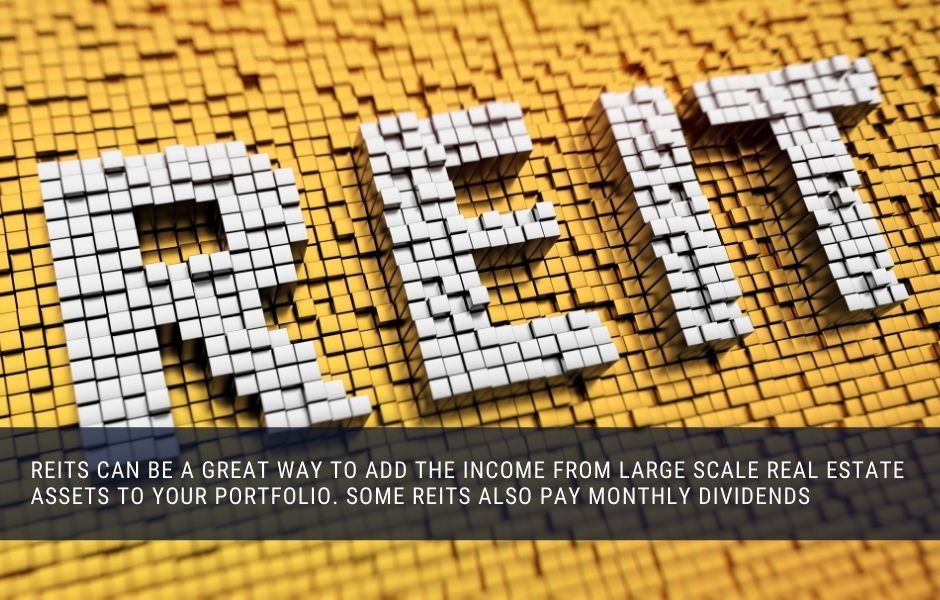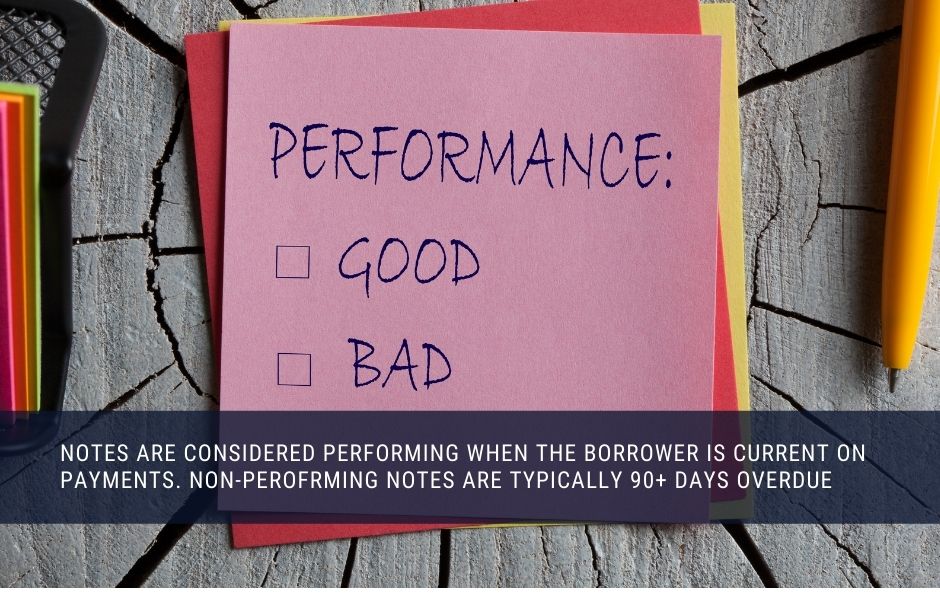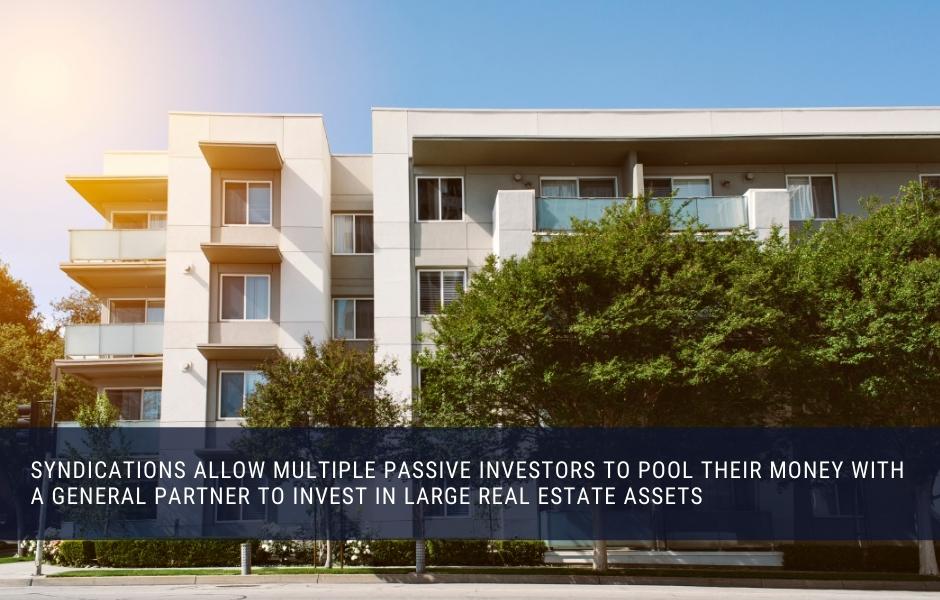4 Ways To Invest Passively In Real Estate for Monthly Income
Looking for more passive monthly income in 2022? Here are 4 ways to invest in real estate to that give you all of the monthly income with none of the issues of property ownership

David Garner
4 Ways to Invest In Real Estate Passively
Real estate has long been upheld as one of the most effective wealth creation tools throughout modern history. But not everyone wants to flip houses or become a landlord. Fortunately, there are now more ways than ever for passive investors to enjoy the income and growth from real estate without having to own or manage physical properties.
In this article I’ll show you 4 great ways to invest passively in real estate that you can add to your investment portfolio or retirement account right away.
Pro Tip: Click here to get NEW monthly income investments in your inbox every Thursday
Real Estate Investment Trusts
Perhaps the easiest, most accessible and most liquid way to add real estate to your portfolio is to purchase shares in a real estate investment trust or REIT.
A REIT is simply a company that owns and operates real estate assets. There are a ton of REITs listed on public stock exchanges, which means the general public can buy and sell shares in the company, and theoretically benefits from the growth and income in the underlying real estate assets.
There are all sorts of REITs specializing in different property sectors, types of buildings, and investment strategies.

Some own exclusively large apartment buildings, other own more niche assets such as industrial or retail properties. There are also REITs that own real estate debt, as well as hybrid REITs that own both physical real estate and debt.
In order to qualify as a REIT, the company must meet certain criteria, such as distributing 90% of it’s real estate income and earning to it’s shareholders.
Because of the way they are structured and the type of assets they own, REITs can be great investments for monthly income.
For investors, there are lots of benefits to investing in real estate via a REIT.
- Exposure to ownership of larger properties
- Exposure to niche real estate sectors
- Professional fund and property management
- Income is usually distributed monthly
- Shares can be bought and sold very quickly and cheaply
- REIT shares qualify for inclusion in all retirement plan accounts
There are other tax benefits to investing in REITs, too, but that’s probably beyond the scope of this article.
So, if you want a quick, easy and passive way to invest in real estate, then buying shares in a REOT might be a good way to start.
Related: 5 REITs paying Monthly Income
Performing Mortgage Notes
If you want to get a little closer to the action, and perhaps have a little more control over your investments, then performing mortgage notes can be a great choice to collect passive income from real estate.
Instead of buying a physical property, a note investor takes the position of the bank and buys the debt attached to the property.

Mortgage notes in general can be a great investment, but it’s important to know what type of note to purchase if you are looking specifically for passive income.
For example, there are performing and non performing notes.
Performing notes specifically are notes where the borrower is up to date with their payments.
They are considered good debt, and there is a multi-billion dollar market where notes are traded between investors of all sizes, from large financial institutions, to Mom and Pop investors.
Because the property owner (borrower) remains responsible for the physical real estate (maintenance, insurance, management and property taxes), the note investor simply collects their monthly interest payments, while the real estate acts as security.
There are really 2 types of performing notes that are most easily accessible to non-institutional investors; reperforming notes and seller finance notes.
Reperforming Notes
Reperforming notes are notes where the borrower stopped making payment at some point. The lender might then sell the note at a discount in order to recoup some of their losses.
The investor that buys the non-performing note may then try to work with the borrower to renegotiation (modify) in the terms of the loan and get the borrower paying again
This investor will then resell the note as a reperforming asset to an investor that is looking for income.
Seller Finance Notes
Seller finance notes are originated when someone sells a piece of real estate, and instead of the buyer getting a traditional mortgage, the seller will take a deposit and carry a note for the balance, effectively becoming the bank themselves.
The e seller may then sell the note to an investor looking for passive income in order to recoup their capital from the sale.

This is common exit strategy for real estate investors that fix and flip homes, and may want to sell their property to a buyer that cannot acquire a traditional mortgage at that time.
There are lots of places you can find mortgage notes for sale, including online note trading platforms, note brokers, and hedge funds.
If you are going to add performing notes to your own investment portfolio, you will need to learn how to conduct some basic due diligence on the property, borrower and paperwork, but once you have a handle on that, performing notes can be a fantastic tool to add more passive income to your investment portfolio.
Related: Note Investing 101 | Everything you Need to Know
Private Lending
Another great way to add truly passive income from real estate to your investment portfolio, is private lending.
In real estate, private lending happens when a passive investor loans money to a real estate investor for a project – usually a renovation project to ‘fix and flip’, or a long term rental project.
Real estate investors use loans from private lenders because they are often much quicker and more flexible than traditional bank mortgages, and because funds are usually only required for a short period of time, private money loans are usually a much more appropriate financing tool.

For the passive investor, private lending is a great way to earn a fantastic rate of interest in your money, while using physical real estate as security for your investment.
There are a few different types of private loans that suit different types of investor.
For those capable and prepared to take a bigger risk, there are opportunities to fund the purchase and renovation of a piece of real estate.
If you are more risk averse, then there are also opportunities to invest in private lending loans that are secured against fully renovated and cash-flowing rental real estate, know as rental loans, DSCR loans or bridge loans.
One of the key benefits to private lending over mortgage note investing, is that the passive investor (lender) gets more say over who they loan money to, what type or property and what type of project.
As a private lender, you also get to set your own terms, such as how long the loan will be for, how much you will loan against any particular property/project, what your interest are will be, and many other factors that come into play with this type of investment.
Related: Private Lending 101 | Everything you Need to Know
Real Estate Syndications
My final pick for passive investing in real estate is real estate syndications.
This is where a passive investor – usually called a limited partner – provides capital to an active investor – the general partner – to purchase a large piece of real estate that require multiple investor to pool their capital to afford.
The vast majority of syndications out there are multifamily apartment buildings.
As a general rule, the GP will do all the heavy lifting such as finding a suitable property to purchase, creating a plan to add value, negotiating the purchase, conducting due diligence, closing the sale, managing the project and the property, and securing debt.

The LP simply puts up some of the purchase capital and plays no part in the day to day management of the project.
The aim of the GP will be to create a return on investment and exit strategy, and will often also put at lest 5% of the required equity into the deal themselves.
Due to some legal restrictions, real estate syndications are often reserved only for investors that qualify as Accredited investor under the criteria set by the Securities and Exchange Commission.
That said, with the explosion in crwodfudningplatform, there are some opportunities for non-accredited investor to participate in a limited number of real estate syndications.
Related: 24 Investments that pay Monthly Income


